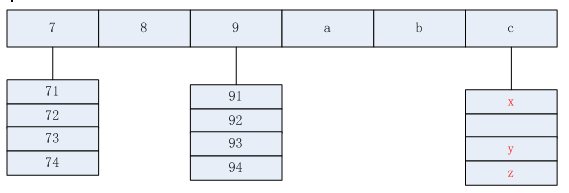只重写equals()但不重写hashCode会有什么后果?
转载自https://www.cnblogs.com/guanmu/p/4894430.html
首先,说下equals和hashCode的关系。JDK API中关于Object类的equals和hashCode方法中说过,总结起来就是两句话:equals相等的两个对象的hashCode也一定相等,但hashCode相等的两个对象不一定equals相等。
hashCode类似于一个位置值(不叫地址值,是想把每个对象所在的位置做地址值),HashSet、HashMap等集合类中常会用到。
上图中假设是对象在内存中的模型,则7~c就是位置值,即hashCode。而71—74就是对象地址值。所以x,y和z的hashCode是一样的,但是x、y和z的equals不一定相等。equals相等 只跟自己类定义的equals方法有关。
假设x是A类的对象,y是B类对象,z是C类对象,A、B和C的equals()都实现为始终返回true,则程序会认为x、y和z是相等的;若都实现为返回false,则x跟自己都不相等。
即equals()是否相等,只依据自定义的equals()方法的判断结果。
当我们重写equals方法时,是有要求的(具体见JDK)。如果只重写了equals,不重写hashCode会有什么影响呢?
假如该类不会放在HashSet等散列表相关的集合类中,不一定会有影响,如下代码:
Model类:
package com.guanmu.test;
/**
*
* 类描述:
*
*
* 所属插件:com.guanmu.test
*
* @author guanmu 2015-10-20
*
*/
public class Model {
private String name;
private String age;
private String otherName;
/**
* @param name
* @param age
* @param otherName
*/
public Model(String name, String age, String otherName) {
super();
this.name = name;
this.age = age;
this.otherName = otherName;
}
/**
* @return the name
*/
public String getName() {
return name;
}
/**
* @param name
* the name to set
*/
public void setName(String name) {
this.name = name;
}
/**
* @return the age
*/
public String getAge() {
return age;
}
/**
* @param age
* the age to set
*/
public void setAge(String age) {
this.age = age;
}
/**
* @return the otherName
*/
public String getOtherName() {
return otherName;
}
/**
* @param otherName
* the otherName to set
*/
public void setOtherName(String otherName) {
this.otherName = otherName;
}
@Override
public int hashCode() {
int a = 7;
int b = 11;
// a和b为不相等的int型常量
int r = a;
r = r*b + name.hashCode();
r = r*b + age.hashCode();
// return r;
return super.hashCode();
}
/* 注意这个重写的equals()只用了name与age这两个属性!!! */
@Override
public boolean equals(Object obj) {
if (!(obj instanceof Model)) {
return false;
}
Model other = (Model) obj;
if (name.equals(other.getName()) && age.equals(other.getAge())) {
return true;
}
return false;
}
/* (non-Javadoc)
* @see java.lang.Object#toString()
*/
@Override
public String toString() {
return "Model [name=" + name + ", age=" + age + ", otherName=" + otherName + "]";
}
}
测试类:
package com.guanmu.test;
import java.util.ArrayList;
import java.util.HashSet;
import java.util.List;
import java.util.Set;
/**
*
* 类描述:
*
*
* 所属插件:com.guanmu.test
* @author guanmu2015-10-20
*
*/
public class EqualsTest {
public static void main(String[] args) {
test1();
test2();
}
public static void test1() {
System.out.println("####:test1");
List list = new ArrayList();
Model a = new Model("a", "20", "test");
Model b = new Model("a","20","abcdef");
Model c = new Model("a","20","");
list.add(a);
System.out.println("a-hashCode:" + a.hashCode());
System.out.println(list);
if (!list.contains(b)) {
list.add(b);
System.out.println("b-hc:" + b.hashCode());
System.out.println(list);
}
}
public static void test2() {
System.out.println("####:test2");
Set set = new HashSet();
Model a = new Model("a", "20", "test");
Model b = new Model("a","20","abcdef");
Model c = new Model("a","20","");
set.add(a);
System.out.println("a-hashCode:" + a.hashCode());
System.out.println(set);
if (!set.contains(b)) {
set.add(b);
System.out.println("b-hc:" + b.hashCode());
System.out.println(set);
}
}
}
结果打印如下:
####:test1
a-hashCode:18923308
[Model [name=a, age=20, otherName=test]]
####:test2
a-hashCode:15136722
[Model [name=a, age=20, otherName=test]]
b-hc:26752749
[Model [name=a, age=20, otherName=test], Model [name=a, age=20, otherName=abcdef]]
- list中能判断出包含了等价的b(因为a和b的name和age属性相同,所以我们自定义的equals()方法就认为a与b等价)
- 但set中认为a和b不相等,set中没有包含b。
- 发现test1()中,ArrayList只根据equals()来判断两个对象是否相等,而不管hashCode是否不相等。
- 而test2()中,HashSet判断流程则不一样,①先判断两个对象的hashCode方法是否一样;②如果不一样,立即认为两个对象equals不相等,并不调用equals方法;③当hashCode相等时,再根据equals方法判断两个对象是否相等。
总结,所以当我们所写的类可能用于存放在Hash相关的集合类中时,在重写equals时,需要重写hashCode,不然会出现与预期不符的结果。从网上搜索了下如何重写hashCode方法,以下据说是《Think in Java》中提到的方法。
@Override
public int hashCode() {
int a = 7;
int b = 11;
// a和b为不相等的int型常量
int r = a;
r = r*b + name.hashCode();
r = r*b + age.hashCode();
return r;
}其中a和b可以为任意不相等常量。
